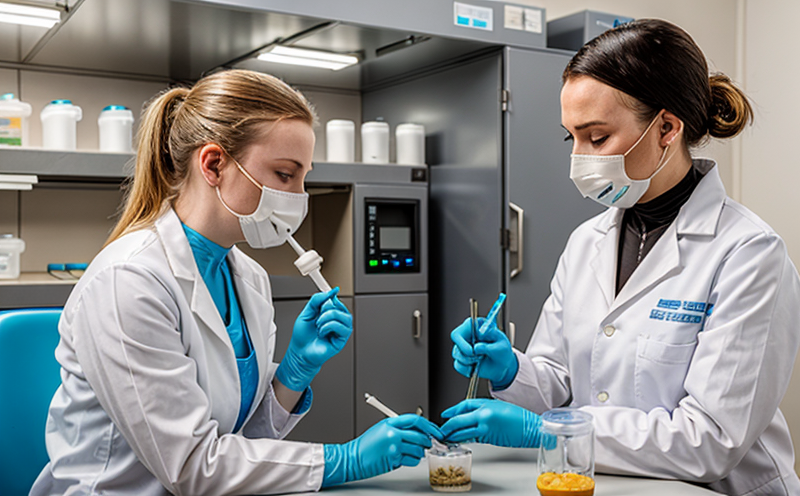ASTM E3794 Ergot Alkaloid Testing in Rye-Based Foods
The presence of ergot alkaloids in rye-based foods can pose serious health risks, including toxicity and potential carcinogenic effects. ASTM E3794 provides a standardized method for the quantification of ergot alkaloids in rye and products derived from it. This service ensures that food manufacturers adhere to regulatory requirements and maintain product safety.
ASTM E3794 outlines specific procedures for sample preparation, extraction, and analysis using high-performance liquid chromatography (HPLC) with diode array detection (DAD). The standard method is crucial in the food industry as it allows laboratories to consistently measure ergot alkaloids across different batches of rye-based products. This ensures that consumers are protected from potential health risks associated with these harmful compounds.
The test process begins with the collection and preparation of samples, which involves thorough cleaning and grinding. The extracted samples are then analyzed for specific ergot alkaloids such as ergotoxine, ergocryptine, and ergocrinine. The HPLC-DAD method provides accurate quantification results that comply with international standards.
Compliance with ASTM E3794 is essential for food manufacturers operating in regions where regulatory bodies enforce strict limits on ergot alkaloids in rye-based products. By adopting this standard, companies can ensure their products meet safety and quality benchmarks. This not only protects public health but also enhances brand reputation and consumer trust.
The methodology described in ASTM E3794 has been validated through rigorous testing and is widely accepted by regulatory authorities worldwide. Its application ensures consistent results across different laboratories, making it a reliable tool for monitoring ergot alkaloid levels in rye-based foods.
| Applied Standards |
|---|
| ASTM E3794: Standard Practice for Sampling and Analysis of Ergot Alkaloids in Rye and Products Derived Therefrom |
The application of ASTM E3794 is critical for ensuring the safety and quality of rye-based foods. By adhering to this standard, food manufacturers can demonstrate their commitment to public health and regulatory compliance.
Applied Standards
| Standard Reference | Description |
|---|---|
| ASTM E3794 | Standard Practice for Sampling and Analysis of Ergot Alkaloids in Rye and Products Derived Therefrom |
The ASTM E3794 standard provides a comprehensive framework for the sampling and analysis of ergot alkaloids in rye-based foods. It ensures that laboratories follow consistent procedures, leading to reliable and accurate test results.
Benefits
- Ensures compliance with regulatory standards
- Promotes product safety and quality
- Enhances consumer trust and brand reputation
- Aids in the prevention of health risks associated with ergot alkaloids
- Supports consistent results across different laboratories
- Facilitates efficient monitoring of ergot alkaloid levels in rye-based products
The implementation of ASTM E3794 offers numerous benefits to food manufacturers, including enhanced regulatory compliance and improved product safety. By adhering to this standard, companies can protect public health while maintaining high-quality standards.
Why Choose This Test
Selecting ASTM E3794 ergot alkaloid testing is vital for food manufacturers who need reliable and accurate results when analyzing rye-based products. The standardized method ensures consistent sampling, extraction, and analysis processes across different laboratories.
This service is particularly beneficial for quality managers, compliance officers, and R&D engineers responsible for ensuring product safety and regulatory compliance. By choosing ASTM E3794 testing, these professionals can demonstrate their commitment to public health and regulatory standards.
The HPLC-DAD method used in this test provides precise quantification of ergot alkaloids, ensuring that the results are accurate and reliable. This level of accuracy is crucial for maintaining product quality and safety.
Food manufacturers who opt for ASTM E3794 testing can also benefit from enhanced consumer trust and brand reputation. By adhering to this standard, companies demonstrate their commitment to public health and regulatory compliance, which can lead to increased customer confidence in the products they produce.





